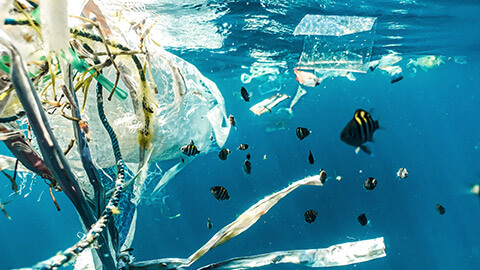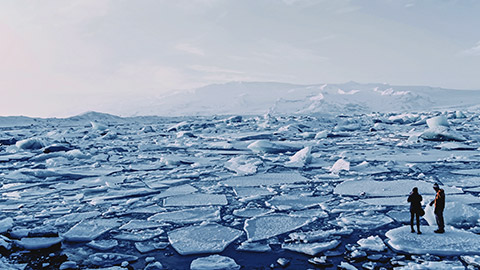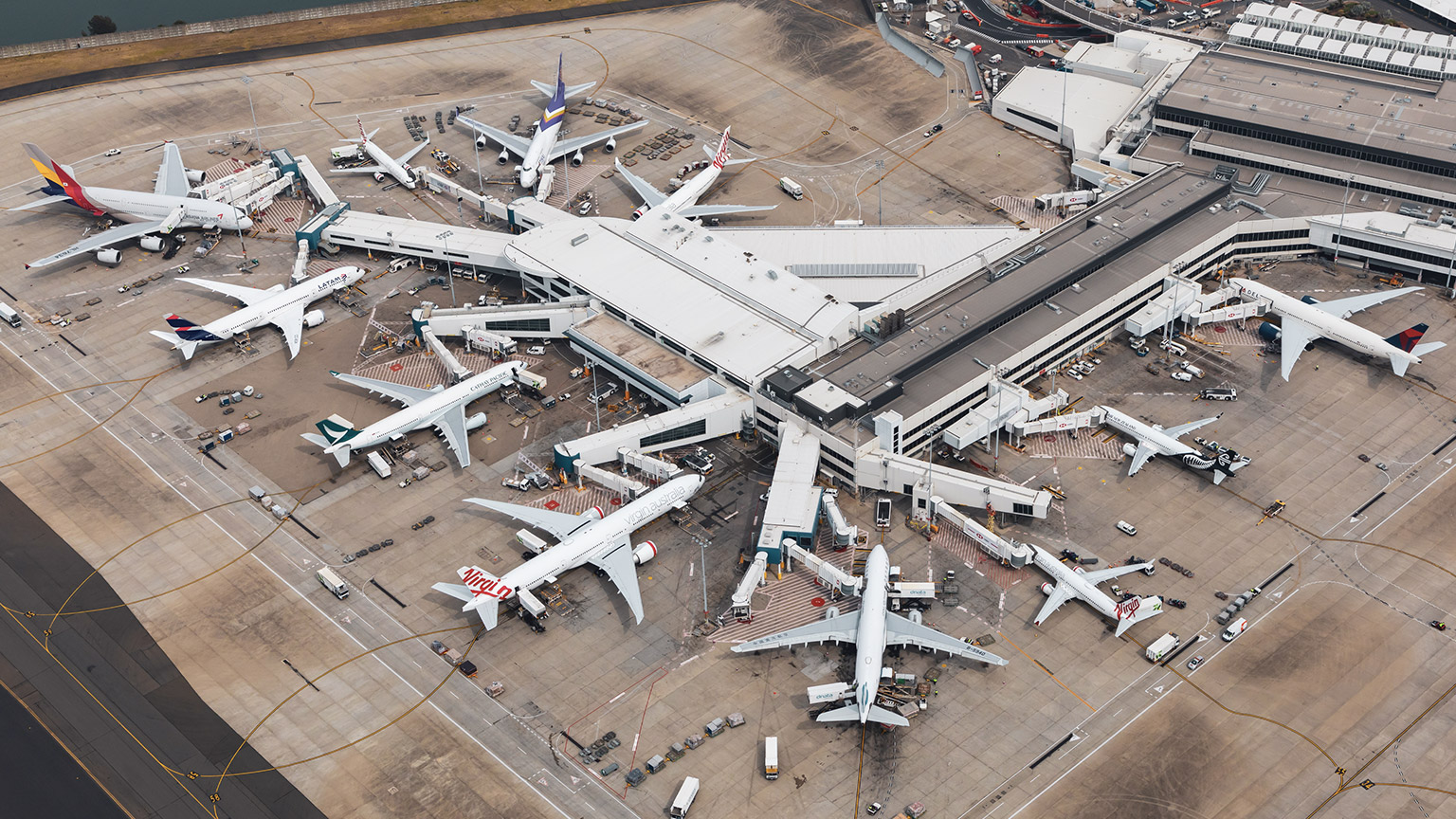In this topic, we will explore current opportunities and challenges that we face today, and we will look at how this impacts global business. At the start of this subject, we have explored how globalisation has led to increasing interdependence. Keep this in mind as we explore the current global environment. As we work through the content in this final topic, you should think about all the various aspects of global business we have covered so far and how we can identify trends and use these to forecast what global business might look like in the future.
Welcome to Topic 11: Current Opportunities and Challenges in the Global Environment. In this topic you will learn about:
- Disruptions to the global business environment
- Opportunities
- Trends and predictions for the future.
These relate to the Subject Learning Outcomes:
- Explain the impact of globalisation on the business environment.
- Describe the fundamental frameworks and strategies for competing successfully in a global economy.
- Outline how global businesses are affected by the type of environment (legal, political, economic, financial and social-cultural) they operate in.
- Discuss the ethical impacts for global businesses with reference to sustainable and responsible practices.
- State the practical factors that impact on global business activities in regard to technology, supply-chain management, marketing and human resources.
- Identify the current challenges and opportunities businesses face in operating globally.
Welcome to your pre-seminar learning tasks for this week. Please ensure you complete these prior to attending your scheduled seminar with your lecturer.
Click on each of the following headings to read more about what is required for each of your pre-seminar learning tasks.
Read Lund, S, Manyika, J, Woetzel, J, Bughin, J Krishnan, M, Seong J & Muir, M 2019, 'Globalization in transition; The future of trade and value chains', McKinsey Global Institute.
Read Sneader, K & Singhal, S 2021, 'The next normal arrives: Trends that will define 2021—and beyond', McKinsey & Company.
Watch Beattie, A 2020, The rise and fall of global trade from the Romans to coronavirus, Financial Times.
Read Witt, MA 2019, 'De-globalization: Theories, predictions and opportunities for international business research', Journal of International Business Studies, 50(7):1053-1077.
Watch the Economist (2020) ‘Will covid kill globalisation?', The Economist.
Based on the self-directed learning tasks you have completed, create a mind map, jotting down the main learnings you feel will impact on the global business environment. You can do this by hand and simply take a photo to share in your reflective journal or use an electronic mind mapping tool. You can access the reflective journal by clicking on ‘Journal’ in the navigation bar for this subject.
- Your topic is: “The future impacts on the global business environment”. Jot this down in the middle of your mind map.
- Simply note down the five (5) main ideas that have stuck with you from the self-directed learning tasks and note those down around the topic. Draw a line from the topic to each main idea.
- Think about what each of the main ideas could mean, or lead to, or how they connect to global business. Draw multiple lines from your main ideas to connect these to the supporting thoughts.
You can reflect on how the main ideas connect to technology, legal, economic/financial, social/cultural and/or ethical factors that may shape the future.
There is a discussion forum activity for this topic, which will enhance your knowledge and give you the opportunity to interact with your peers. You can access the activities by clicking on 'Topic 11: Forum Activity 1' you can also navigate to the forum by clicking on 'BUS100 Subject Forum' in the navigation bar for this subject.

Disruptions to the global business environment
There are various challenges that we can explore as disruptions to the global business environment.
Every three (3) years, a crisis or catastrophic event creates disruption lasting two (2) to four (4) weeks on average (McKinsey 2020). Different to earlier crises that disrupt the global environment, such as the global financial crisis of 2008, the current worldwide pandemic as a health crisis (not a financial one) first affects people‘s behaviour in various ways and secondly has consequences for global business (Peng & Meyer 2019).
Emerging economies were once seen as a trend; however, many of these are established and do not simply replicate their approach. Many of these fast-growing economies are already operating in a different way to the established regions of America, Europe and China. The current environment may act as a catalyst and disrupt these differences even further (O’Sullivan 2021).
We have discussed previously, the interdependence that globalisation has led to (Peng & Meyer 2019). The impacts of this interdependence have been highlighted through breakdowns in global supply chains and the spread of flow-on effects from one struggling corporation to other parts of its operation or collaborators. It is this interdependence, or the hyper-connectivity of the world which globalisation has led to, which creates these systemic risks where something that affects one (1) part of the world, also affects other areas, this is referred to as the butterfly defect (Goldin & Mariathasan 2014). This means we are more vulnerable to cyber-attacks, pandemics, and crises.
Social capitalism
The interdependence of people and the good of humanity may lead to a stronger focus on social capitalism. Social capitalism challenges the concept that capitalism, in its essence, creates inequalities. This trend may impact on global business through a greater focus on values driven businesses and corporate social responsibility; especially in regard to social well-being (Parakala 2020; Goldin & Mughal 2020).
Glocalisation
As part of the debate around globalisation, we saw the authors' differences in views when it comes to a localised approach for global business. Glocalisation is a fusion of the terms globalisation and localisation. This is used to describe a product or service that develops as part of a global corporation but is adjusted to local markets. In the future, this regionalised approach to global business will become even more important. In fact, it could become so important that we will see a more fragmented localised approach to business models that move away from large global business structures (Parakala 2020).
Working remotely
Working remotely has become more prominent than ever before. This change could shift work patterns in an ongoing manner. For example, business travel may be reduced now that virtual meetings and collaboration are commonplace (Singhal 2021).
Impact on supply chains
The pandemic has had a significant impact on supply chains, leading to fragmentation, delays, and unavailability of resources (the Economist 2020; Beattie 2020; Lund et al. 2019). It is expected that the impact on supply chains will continue even if the world recovers relatively quickly from the current pandemic. We have seen individual countries stockpile, complete and encourage domestic manufacturing to reduce the risks associated with the impact on global supply chains (Seymour & Oldfield 2021). Especially in the areas of critical supplies and healthcare, this disruption is likely to continue.
Fiscal challenges
In terms of fiscal challenges, recovery for governments is likely to result in less spending and/or higher taxes (Singhal 2021). This may impact how global corporations are taxed, which may influence future decision making about where to establish (parts of) global operations.
Environmental impacts

Global business has significant environmental impacts. This is because of the flow of services and goods as well as increased travel across the world. Increased transportation, where global corporations transport goods and source resources and labour across different markets, and the power supply and industrial manufacturing processes have resulted in increased greenhouse gas emissions and ecosystem destruction (UNCTAD 2021).

Climate change poses significant risks, in fact, the 2020 global risk report identified climate related issues dominating all the top five (5) long-term risks facing our economic system (World Economic Forum 2020). In terms of economic impact, it is both the predicted extreme weather events as well as the formulation of new trade agreements and barriers based on curbing carbon emissions that can be expected (UNCTAD 2021).
Opportunities
Political decision-making, as part of the recovery in a post pandemic world may have a bigger impact on global business. However, it is likely that cost or economic logic is expected to remain a driver when corporations decide where to establish parts of their operation. In this sense global supply chains remain an opportunity.
Technological advances, as well as automation, are expected to play a big part both in the way business is conducted as well as in the mitigation of supply chain risks and efficiencies.
Opportunities can also be found in combating other risks such as those identified in the Global Risks Report (World Economic Forum 2020). For example, think about clean and green technologies, solutions to counter the threat of cyber terrorism, data privacy and in the health care sector.
The following table illustrates the top 10 global risks we face in the next 10 years (World Economic Forum 2020).
| Impact | Area Affected |
|---|---|
| Climate action failure | Environmental |
| Biodiversity loss | |
| Extreme weather | |
| Natural disasters | |
| Human-made environmental disasters | |
| Weapons of mass destruction | Geopolitical |
| Water crises | Societal |
| Infectious diseases | |
| Information infrastructure breakdown | Technological |
| Cyberattacks |
Adapted from Global Risks Report 2020, World Economic Forum.
Trends and predictions for the future
While business travel is expected to remain at the lower levels than before, the pandemic leisure travel is forecast to bounce back. This will impact domestic travel, which we are already staying back at close to pre-pandemic levels and international travel as borders reopen.
Healthcare reform and innovation are likely to be a major area of growth. Remote solutions such as telehealth, digital support platforms, and alternate delivery models will likely retain momentum.
Online retail, which has bloomed during COVID-19, has changed consumer buying behaviour. This trend where consumers are moving online globally is likely to continue.
Increasing recognition of the environmental impacts has led to a growing trend in renewable energy. As a result, green growth is predicted for sectors such as energy, transport, and agriculture. Similarly, green technology solutions are likely to gain momentum. With these trends, globalisation may provide opportunities for more streamlined research and development.
Learning task: Impacts for your chosen country
In your reflective journal, go back to the mind map you created at the start of the topic and reflect on how your mind map findings may impact the chosen country for your global expansion report. Jot down a couple of thoughts in relation to these future impacts. This will be discussed as part of the individual student consultations.
Knowledge check
Key takeouts
Congratulations, we made it to the end of the eleventh topic! Some key takeouts from Topic 11:
- It is interdependence or the hyper-connectivity of globalisation that has led to which creates these systemic risks.
- There are a number of challenges that disrupt the global business environment. These include changes to:
- supply chains
- the future of work
- climate change
- a shift to social capitalism.
- Healthcare, online retail, and leisure travel are expected to be future growth areas.
- Green growth is predicted as a major trend; especially for:
- energy
- transport
- agriculture sectors.
Welcome to your seminar for this topic. Your lecturer will start a video stream during your scheduled class time, you can access your scheduled class by clicking on ‘Live Sessions’ found within your navigation bar and locating the relevant day/class or by clicking on the following link and then click 'Join' to enter the class.
Click here to access your seminar.
The learning tasks are listed below, these will be completed during the seminar with your lecturer. Should you be unable to attend, you will be able to watch the recording which can be found via the following link or by navigating to the class through ‘Live Sessions’ via your navigation bar.
Click here to access the recording. (Please note: this will be available shortly after the live session has ended.)

In-seminar learning tasks
The in-seminar learning tasks identified below will be completed during the scheduled seminar. Your lecturer will guide you through these tasks. Click on each of the following headings to read more about the requirements for each of your in-seminar learning tasks.
Based on the mind map you created as part of this topic’s self-directed study tasks, we will discuss what you feel might be important trends and opportunities.
This is an important opportunity to relate the future challenges and opportunities to your chosen country for the global expansion report. Note down any questions for your lecturer and send them to your lecturer beforehand or raise these as part of the seminar.
As part of the scheduled seminar and consultation session your lecturer will be checking in with you on the third assessment: the global expansion report.
Welcome to your post-seminar learning task for this week. Please ensure you complete this after attending your scheduled seminar with your lecturer. Your lecturer will advise you if this is to be completed during your consultation session.Click on the following heading to read more about the requirements for your post-seminar learning task.
Finalise your global expansion report (assessment 3) as per the assessment instructions set out in the study guide.
Each week you will have a consultation session which will be facilitated by your lecturer. You can join in and work with your peers on activities relating to this subject. These session times and activities will be communicated to you by your lecturer each week. Your lecturer will start a video stream during your scheduled class time, you can access your scheduled class by clicking on ‘Live Sessions’ found within your navigation bar and locating the relevant day/class or by clicking on the following link and then click 'Join' to enter the class.
Click here to access your seminar.
Should you be unable to attend, you will be able to watch the recording which can be found via the following link or by navigating to the class through ‘Live Sessions’ via your navigation bar.
Click here to access the recording. (Please note: this will be available shortly after the live session has ended.)

- Ghemawat, P 2018, The New global road map: Enduring strategies for turbulent times, Harvard Business Review Press.
- Video: AIB Journals Webinar, Shifts in globalization and anti-globalization, speakers: Simon Evenett, Michael Witt and Olga Petricevic, moderator: Klaus Meyer, YouTube, May 21, 2020.
- Video: O’Sullivan, M 2021 ‘The end of globalization (and the beginning of something new)’,
References
- AIB 2020, AIB Journals Webinar: Shifts in Globalization and Anti-globalization, streaming video, YouTube, https://www.youtube.com/watch?v=3LtXquJ6IOQ
- Beattie, A 2020, The rise and fall of global trade from the Romans to coronavirus, Financial Times, https://www.ft.com/video/fa0705b9-74cc-4169-ab00-5b1d4216b120?playlist-name=latest&playlist-offset=88
- The Economist 2020, Will covid kill globalisation?, streaming video, YouTube, https://www.youtube.com/watch?v=KJhlo6DtJIk
- Farell, H & Newman, A 2020, This is what the future of globalization will look like, Foreign Policy, https://foreignpolicy.com/2020/07/04/this-is-what-the-future-of-globalization-will-look-like/
- Ghemawat, P 2018, The new global road map: Enduring strategies for turbulent times, HBR Publishing.
- Goldin, I & Mariathasan, M 2014, The butterfly defect, Princeton University Press.
- Goldin, I & Muggah, R 2020, Why the world needs better - not less - globalization, World Economic Forum, https://www.weforum.org/agenda/2020/12/the-world-is-divided-between-those-for-and-against-globalisation-what-if-we-just-did-it-better/
- Lund, S, Manyika, J, Woetzel, J, Bughin, J, Krishnan, M, Seong, J & Muir , M 2019, Globalization in transition; the future of trade and value chains, McKinsey Global Institute, https://www.mckinsey.com/featured-insights/innovation-and-growth/globalization-in-transition-the-future-of-trade-and-value-chains
- Masood, A & Lee, N 2021, The Future of Globalization, Centre for Global Development, https://www.cgdev.org/blog/future-globalization
- McKinsey 2020, How a post-pandemic stimulus can both create jobs and help the climate, McKinsey Sustainability, https://www.mckinsey.com/business-functions/sustainability/our-insights/how-a-post-pandemic-stimulus-can-both-create-jobs-and-help-the-climate
- O’Sullivan, M 2021, The end of globalization (and the beginning of something new), streaming video, YouTube, https://youtu.be/zY0U0O6VsOA
- Parakala, K 2020, Ten emerging trends shaping our new future, GHD, https://www.ghd.com/en/perspectives/ten-emerging-trends-shaping-our-new-future.aspx
- Seymour, T & Oldfield, R 2021, Localisation is the new globalisation, PW, https://www.pwc.com/gx/en/issues/reinventing-the-future/take-on-tomorrow/localisation-globalisation.html
- Singhal, S 2021, The next normal arrives: Trends that will define 2021—and beyond, McKinsey & Company, https://www.mckinsey.com/featured-insights/leadership/the-next-normal-arrives-trends-that-will-define-2021-and-beyond
- UNCTAD, 2021, Climate change, green recovery and trade, United Nations Publication, https://unctad.org/system/files/official-document/ditcted2021d2_en.pdf
- Witt, M 2019, ‘De-globalization: Theories, predictions and implications for international business research’, Journal of International Business Studies, 50(7):1053-1077, https://link.springer.com/article/10.1057/s41267-019-00219-7
- World Economic Forum, 2020, Global risks report, World Economic Forum http://reports.weforum.org/global-risks-report-2020/

